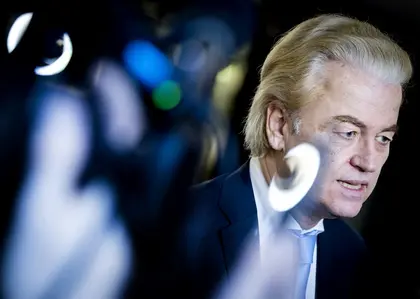The Netherlands’ new leader whose manifesto calls for a halt in weapons supplies to Ukraine suffered a major setback on Wednesday evening as he tries to form a government coalition.
Remind me, who is this?
JOIN US ON TELEGRAM
Follow our coverage of the war on the @Kyivpost_official.
Geert Wilders is a far-right anti-EU advocate that calls for a “sovereign Netherlands.”
His far-right PVV Freedom Party last week won the Dutch elections and captured 37 seats in the Dutch parliament.
Wilders has long been opposed to military aid to Ukraine. The Netherlands has been one of Ukraine’s biggest military partners since the full-scale invasion began and was – alongside Denmark – the first to say it would provide F-16 fighter jets to Ukraine.
His party also called for a referendum for the Netherlands to leave the EU and stop contributing financially to the union prior to the referendum. It also rejected further EU expansion and wished to restore its veto power in Brussels.
As Ukraine’s EU negotiations are bound to start soon, Wilders’ victory could be a stumbling block to Kyiv’s chances of gaining a secured foothold in the upcoming negotiations.
What happened yesterday?
Since winning the Dutch election last week, Wilders has been trying to form a coalition government but yesterday a key potential partner ruled itself out, uncomfortable with his extreme views.
Wilders needs the backing of 76 MPs in the 150-seat parliament for a working majority, AFP reports.

Thousands Rally Against Slovakia Seeking Closer Russia Ties
His PVV Freedom Party shocked everyone by clinching 37 seats – far beyond what polls had predicted. His preferred coalition is with the BBB farmers party (seven seats), the all-new pro-reform New Social Party (20 seats) and the current ruling party, the center-right VVD (24 seats).
The VVD has already ruled out participation, saying it would “support a center-right coalition” from the opposition benches. The BBB and the NSC were seen as more amenable.
But the NSC and its popular leader Pieter Omtzigt said Wednesday it did not see a way of working with the PVV unless it clarified the more extreme parts of its manifesto.
“All in all, the NSC faction does not now see any basis to start talks with the PVV about a majority or a minority government,” said a letter from Omtzigt to the “scout” charged with overseeing the negotiations.
The PVV manifesto “contains views which in our judgement go against the constitution... here we draw a hard line,” said the letter.
The manifesto calls for a ban on mosques, headscarves and the Koran, as well as a referendum on a “Nexit” – the Netherlands leaving the European Union.
What has Wilders said?
Wilders moderated his tone during the election campaign and has stressed since election night that he wants to be prime minister “for all Dutch” regardless of race or religion.
“We notice that Mr Wilders has said he wants to put the relevant parts of his manifesto 'in the freezer.’ But it is not clear what he means by this. What is the status of the PVV manifesto now?” asked the NSC.
Omtzigt’s letter also set out “several obstacles” in terms of policy to working with the PVV, mentioning Ukraine, a Nexit, and fiscal soundness.
If a working coalition could not be formed, Omtzigt suggested, among other options, a “cabinet of experts” made up of non-politicians.
Wilders himself reiterated his call for the leaders of his preferred coalition to sit down together and “see what is possible.”
He said he and his party were prepared to be “firm but reasonable” about their policies and that “no one should doubt that I am for all Dutch people, Christians, Muslims, or non-believers.”
He has also raised the prospect of a minority government if he is unable to convince others to join him.
Is this a common situation in Dutch politics?
While Wilders’ views are not typical of Dutch politics, the lengthy process of forming coalition governments is.
The process of forming a government in the fractured Dutch political system typically takes several months – the last coalition of Prime Minister Mark Rutte took 271 days.
Wilders has said it can be achieved “in a couple of weeks” if all the parties came to the negotiating table but most experts think a government will not be announced before the middle of next year.
The process itself got off to a chaotic start when Wilders’ hand-picked “scout,” who shuttles between parties to see who can work with whom, quit over fraud allegations before negotiations even began.
What does this mean for Ukraine?
It looks positive overall – Wilders can’t stop aid to Ukraine until a government is formed and there’s a chance it could be something he has to compromise on in order to move forward.
You can also highlight the text and press Ctrl + Enter






